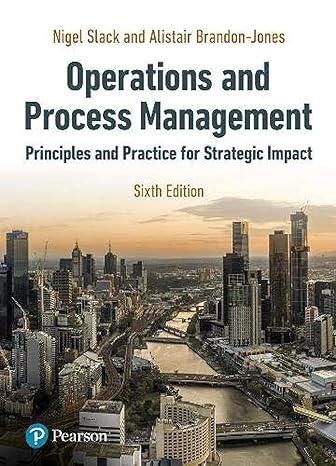2. Consider this record of an ordinary flight: Breakfast was a little rushed but left the house...
Question:
2. Consider this record of an ordinary flight: ‘Breakfast was a little rushed but left the house at 6.15. Had to return a few minutes later, forgot my passport. Managed to find it and leave
(again) by 6.30. Arrived at the airport 7.00, dropped Angela off with bags at terminal and went to the long-stay car park. Eventually found a parking space after 10 minutes. Waited 8 minutes for the courtesy bus. Six-minute journey back to the terminal; we started queuing at the check-in counters by 7.24. Twenty-minute wait. Eventually get to check-in and find that we have been allocated seats at different ends of the plane. Staff helpful but take 8 minutes to sort it out. Wait in queue for security checks for 10 minutes. Security decide I look suspicious and search bags for 3 minutes. Waiting in lounge by 8.05. Spend 1 hour and 5 minutes in lounge reading computer magazine and looking at small plastic souvenirs.
Hurrah, flight is called at 9.10, takes 2 minutes to rush to the gate and queue for further 5 minutes at gate. Through the gate and on to air bridge that is a continuous queue going onto plane; takes 4 minutes but finally in seats by 9.21. Wait for plane to fill up with other passengers for 14 minutes. Plane starts to taxi to runway at 9.35. Plane queues for 10 minutes to take off. Plane takes off at 9.45. Smooth flight to Amsterdam, 55 minutes.
Stacked in queue of planes waiting to land for 10 minutes. Touch down at Schiphol Airport 10.50. Taxi to terminal and wait 15 minutes to disembark. Disembark at 11.05 and walk to luggage collection (calling at lavatory on way); arrive luggage collection 11.15. Wait for luggage 8 minutes. Through customs (not searched by Netherlands security who decide I look trustworthy) and to taxi rank by 11.26. Wait for taxi for 4 minutes. Into taxi by 11.30;
30-minute ride into Amsterdam. Arrive at hotel 12.00.’
a) Analyse the journey in terms of value-added time (actually going somewhere) and nonvalue-
added time (the time spent queuing, etc.).
b) Visit the websites of two or three airlines and examine their business-class and first-class services to look for ideas that reduce the non-value-added time for customers who are willing to pay the premium.
c) Next time you go on a journey, time each part of the journey and perform a similar analysis.
Step by Step Answer:

Operations And Process Management Principles And Practice For Strategic Impact
ISBN: 978-1292350066
6th Edition
Authors: Alistair Brandon-Jones






